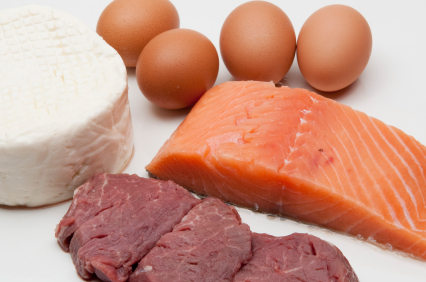- Home
- Our story
- Nutrition Quickies
- Products
- Ingredients
- Articles
- Success Stories
- Contact Us
- Timeless Radiance
- JayLab Pro Prosta-7
- BloodFlow Guardian
- VG-6
- Ultimate Sleep Solution
- Fermented Turmeric
- Collagen Complex
- Ultra-Cleanse Detox
- Krill oil
- Probiotics
- Advanced Joint Support
- Gluco Guardian
- Multi-vitamin (Active Core Complex)
- Renewal for men (T20)
- Protein powder
- Combo-packs
- Login
Should You Eat More Protein? Only If You’re One Of These THREE People
By Kevin DiDonato MS, CES--Level 1 Certified Precision Nutrition and Certified Personal Trainer
 Do you need more protein?
Do you need more protein?
This is a common question and one that may not have a clear cut answer.
The recommendation for protein intake, according to the RDA, is 0.8g/kg/bodyweight.
This equates to roughly 42 grams for the average woman and roughly 65 grams for the average man.
So, do you need more protein in your diet?
Well, if you are a sedentary individual, then probably not. You’re probably getting enough protein already to sustain your body.
But:
If you fall within these THREE categories, then it may not hurt you to increase your protein intake:
1. You’re Very Active
Now, being very active means that you do roughly 30 to 45 minutes of exercise each day and at least three days a week of strength training.
If you consider yourself very active, then yes, you should increase your protein intake!
The reason why is simple: You break down muscle tissue when you exercise. And the higher your protein intake is, the better your body may be at utilizing the protein for repairing muscles.
And if you do higher intensity exercise (like sprints, bootcamps, hill climbs, etc.), then you may want to stay closer to
the higher range if possible.
The recommendations for those who are very active jumps from 0.8g/kg/BW to roughly 1.2 to 2.0g/kg/BW!
2. Weight Loss
 If you’re looking to lose weight, then increasing your protein intake would be a good thing!
If you’re looking to lose weight, then increasing your protein intake would be a good thing!
Not only does protein help maintain lean muscle mass, but it could also help to control appetite and cravings.
You see, protein takes longer to digest in your body than other foods.
And this slow rate of digestion could help to boost satisfaction after a meal, helping you to hold off on seconds (or even thirds).
Plus, since it takes longer to digest, you actually BURN CALORIES when digesting protein (thermic effect of food).
And, when you’re on a plan that restricts your calories, you may actually lose lean muscle mass.
By increasing your protein, you may actually prevent this tissue breakdown, which could help keep your metabolism higher.
So, in order to prevent the lean muscle breakdown often associated with weight loss, you should focus on increasing your protein intake to 1.8g/kg/BW to 2.0g/kg/BW.
3. You’re Middle Aged
As you get older, your muscle mass may start to decline!
And this could increase your risk for falls and osteoporosis. But, if you increase your protein, you may actually prevent the age-related decline in lean mass.
Studies show that just 1.5g/kg/BW may help to maintain—and even rebuild—lost muscle mass due to inactivity and the aging process.
It’s especially important to maintain protein as you get older in order to stay more agile, keep your joints mobile, and to stay strong and functional—no matter your age!
Take Home Message
There are a lot of diets out there that stress the importance of getting more protein at each meal.
And, although this may be sound advice, not everyone needs to increase their intake of protein.
Studies show that the average woman and man probably meet the recommended intake for protein in any given day.
But there are some times when more protein would be better! If you’re trying to lose weight, you should keep your
protein higher.
If you’re looking to stay strong and functional as you get older, then you may want to keep protein levels up.
And if you’re very active and want to keep—or improve—your performance, then keeping your protein intake at the highest recommended levels would be very beneficial for you.
If you’ve been wondering if increasing your protein is a good thing, consider these three different scenarios in order to determine the recommended intake that would be right for you.



